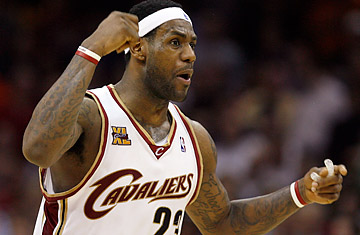
The Cleveland Cavaliers' LeBron James, in a game against the Milwaukee Bucks on March 31, 2010
In case you haven't heard, one of the best basketball players on the globe became a free agent this summer. In his seven seasons in the NBA, he has averaged 25.4 points per game and won a scoring title, and he was first-team All-NBA for the last two seasons. He was the leading scorer on the 2008 Olympic U.S. basketball team that brought home the gold medal. He's the kind of athlete who can singlehandedly change the fortunes of a franchise and deliver immeasurable joy to the citizens of the NBA city lucky enough to have him on their team.
In fact, he could probably strong-arm ESPN into carrying his free-agency decision on live television, in prime time. But Dwyane Wade didn't go that route.
At 9 p.m. on Thursday, LeBron James will bless the world with his free-agency decision during a one-hour ESPN telecast. By contrast, Wade quietly confirmed reports yesterday that he was resigning with the Miami Heat and that Olympic teammate Chris Bosh, the five-time All-Star forward formerly of the Toronto Raptors, would join him in South Beach. Where was Wade's TV show? After all, he's the one with the NBA championship that James is so desperately chasing.
The pieces of the great free-agency puzzle are finally starting to fall into place. Bosh and Wade are teaming up for the Heat — and James could join them to form a seemingly unstoppable core that is already being dubbed "Miami Thrice." Also on Wednesday, the Chicago Bulls signed Carlos Boozer, another 2008 Olympian and a two-time All-Star. And as is their wont, the New York Knicks overpaid for a talented but injury-prone and likely past-his-prime player, giving Amar'e Stoudemire $100 million in an attempt to restore some respectability to Big Apple basketball.
In fact, buried beneath all the breathless hysteria about James' future is a disturbing trend: the insane decisionmaking of NBA executives. The league's salary-cap structure requires teams to make prudent financial choices. If your team underperforms, it's wise to reduce your future salary obligations so you'll have the flexibility to add assets that can improve your performance. Yet despite these constraints, the Memphis Grizzlies, a team that has averaged 55 losses over the past four years, gave a five-year, $82 million contract to forward Rudy Gay. Yes, Gay is a fine young talent. But if he is truly worth $82 million, shouldn't he have led Memphis to at least one winning record in his three years with the team?
Similarly, the Atlanta Hawks tied their future to guard Joe Johnson, who won himself a six-year, $119 million contract this off-season despite averaging a measly 12.8 points per game during the second round of the playoffs, when his Hawks were swept by the Orlando Magic. Even Darko Milicic, the Serbian center who was selected No. 2 overall, behind James, in the 2003 draft and quickly became an all-time bust, received a four-year, $20 million contract from the Minnesota Timberwolves. He averaged 6.7 points per game last season. Whose pay is more out of line with their performance, some NBA players or Wall Street CEOs?
James, however, will certainly prove a worthwhile investment for whichever team secures his services. But a backlash is brewing about the way in which he's hogging the spotlight. The blogosphere has turned against him. "An hour show? WTF?" wrote a commenter on FoxSports.com, a sentiment that is clearly growing among fans, media and even fellow NBA players. "There's definitely a collective eye roll," says a Western Conference player who has discussed the James extravaganza with several colleagues. "Wade and Bosh had fun with it but then just made their decision. With LeBron, it's all about him. He talks about wanting to be one of the greatest of all time, like [Michael] Jordan, like Kobe [Bryant]. But Jordan and Kobe would never do this. He's trying to be bigger than the game."
In fairness, advertising revenues from the show, which is being sponsored by companies like McDonald's, the University of Phoenix, Bing and Vitamin Water, will be donated to the Boys & Girls Clubs of America, to help the organization build basketball courts. James' team certainly could have picked a more socially important cause — there's not exactly a basketball-court shortage in this country — yet the sentiment is worthy. Plus, the whole spectacle keeps the NBA, fresh off the Finals' Game 7 — its highest-rated game since 1998 — in the sports conversation. "It's a positive," say former New Jersey Nets coach Lawrence Frank. "Even though we have the World Cup and the baseball season is going on, we're still talking about the NBA."
But haven't we passed the point of fatigue? This isn't about the actual game. This is all about the ego of King James. On Wednesday, Kevin Durant, who is close to joining Bryant, James and Wade in the "best player on the planet" debate, signed a five-year, $85 million contract extension with the Oklahoma City Thunder. He quietly shared the news on Twitter. No talk about building a billionaire brand. It was just a rare gesture of loyalty to the small-market team that has enabled him to shine. It's hip to skip the prime-time drama.
"There's one thing I know for sure," says the Western Conference player, of the James ESPN special. "I can't wait for this s___ to be over with." Here's one thing we know for sure: he's not alone.
